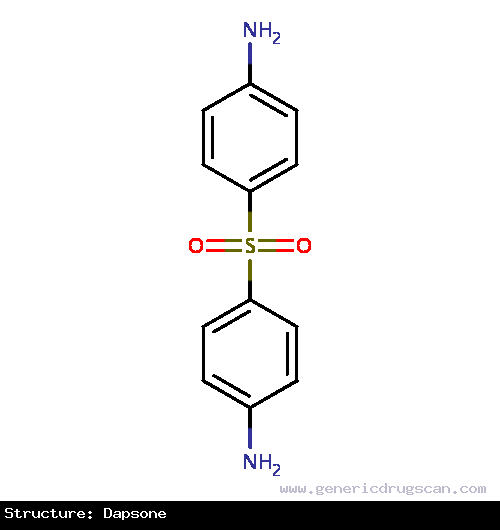Dapsone Drug: Indication, Dosage, Precaution, Side Effect , Storage, Category Type and corresponding Brands - www.genericdrugscan.com
Dapsone
Drug Status in USA : ApprovedDrug Status in Canada : Approved
pronunciation
pronounced as (dap' sone)
Why is this medication prescribed?
Dapsone is used to treat leprosy and skin infections.
This medication is sometimes prescribed for other uses; ask your doctor or pharmacist for more information.
How should this medicine be used?
Dapsone comes as a tablet to take by mouth. Dapsone usually is taken either once a day or three times a week. Follow the directions on your prescription label carefully, and ask your doctor or pharmacist to explain any part you do not understand. Take dapsone exactly as directed. Do not take more or less of it or take it more often than prescribed by your doctor.
What are the precautions to be followed?
Before taking dapsone,- tell your doctor and pharmacist if you are allergic to dapsone, sulfa drugs, phenylhydrazine, naphthalene, niridazole, nitrofurantoin, primaquine, or any other drugs.
- tell your doctor and pharmacist what prescription and nonprescription medications you are taking, especially aminobenzoate potassium (Potaba), aminobenzoic acid, clofazimine (Lamprene), didanosine (Videx), probenecid (Benemid), pyrimethamine (Daraprim), rifampin (Rifadin), trimethoprim (Bactrim, Cotrim, Septra), or vitamins.
- tell your doctor if you have or have ever had anemia or liver disease.
- tell your doctor if you are pregnant, plan to become pregnant, or are breast-feeding. If you become pregnant while taking dapsone, call your doctor.
- plan to avoid unnecessary or prolonged exposure to sunlight and to wear protective clothing, sunglasses, and sunscreen. Dapsone may make your skin sensitive to sunlight.
What are possible side effects of this medication ?
Dapsone may cause side effects. Tell your doctor if any of these symptoms are severe or do not go away:- upset stomach
- vomiting
- sore throat
- fever
- rash
- yellowing of the skin or eyes
- unusual bruising
How to store the medication and dispose it of after its use later?
Keep this medication in the container it came in, tightly closed, and out of reach of children. Store it at room temperature and away from excess heat and moisture (not in the bathroom). Throw away any medication that is outdated or no longer needed. Talk to your pharmacist about the proper disposal of your medication.
Drug Category/Class
- Antimalarials
- Folic Acid Antagonists
- Anti-Infective Agents
- Leprostatic Agents
- Anti-Acne Preparations
- Antimycobacterials
- Anti-Acne Preparations for Topical Use
- Drugs for Treatment of Lepra
- CYP2E1 Inhibitors
- CYP2E1 Inducers
- CYP2E1 Inducers (strong)
- Cytochrome P-450 CYP2C9 Inhibitors
- Cytochrome P-450 CYP2C8 Inhibitors
- Cytochrome P-450 CYP2C9 Inducers
- Cytochrome P-450 CYP2C
| Prescribed | For the treatment and management of leprosy and dermatitis herpetiformis. |
| Weight : | 248.301 |
| Structure | Dapsone |
 | |
| Formula | C12H12N2O2S |
Dapsone has 5 Brands listed
| Acnesone (Skin) (10 gm) | Acnesone (Skin) (20 gm) |
| Dapsone (100 mg) | Dapsone (25 mg) |
| Dapsone (50 mg) |
Search Generic Drugs alphabetically
